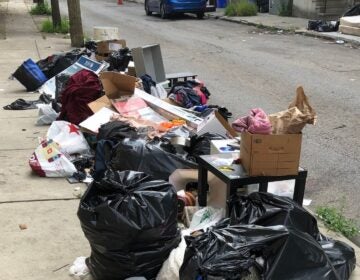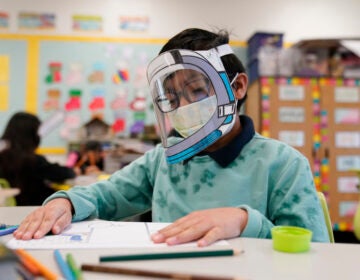‘Muddy’ messaging in Philly: SEPTA and city mask policies conflict and confuse
Less than 24 hours after the city's mask mandate went into effect, the city’s regional transit provider SEPTA announced that masks would no longer be required on its vehicles.
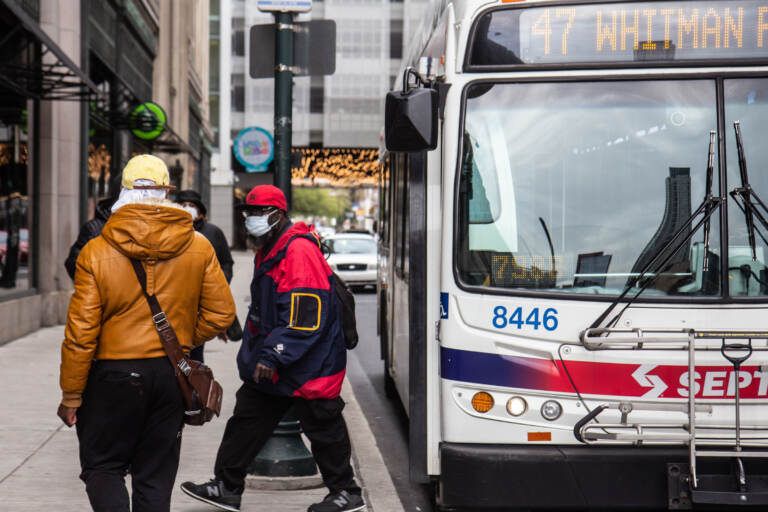
FILE - SEPTA bus in Center City Philadelphia. (Kimberly Paynter/WHYY)
The COVID-19 pandemic has changed everything. What should we know about how you approach the world now? How has the pandemic changed your social life, your work life, your interactions with your neighbors? Get in touch here.
Late Monday evening — less than 24 hours after Philadelphia’s indoor mask mandate went into effect — the city’s regional transit provider SEPTA announced that masks would no longer be required on its buses, trains, subways, and trolleys.
The loosening requirement came after a federal judge in Florida ruled that the CDC had over-extended its authority in enforcing a mask requirement on mass transit. Effective immediately, transportation outfits ranging from private airlines to public transit agencies like SEPTA, which had been following the regulations of the federal Transportation Security Administration, were allowed to lift their mask requirement.
Before Monday, SEPTA vehicles had been some of the only remaining venues where Philadelphians were required to wear masks — that’s because the agency was subject to the federal transit mask requirement.
To many, that indicated that they were an area where infection could spread easily.
“That’s where you really need to wear a mask, because you have all kinds of people on there,” said Sarah Donaldson, who was waiting for the bus on Market Street on Tuesday afternoon. “I’m gonna keep wearing my mask, because you know some folks are nasty,” she added.
Many riders on Tuesday afternoon were confused about the regulations or unaware that SEPTA had lifted its mandate. The default, it seemed, was to continue with business as usual: The vast majority of people boarding and getting off buses and trains in Center City were still masked.

SEPTA in line with transit agencies, out of step with Philly
When the federal court order was released Monday morning, transit authorities across the country announced how they would respond.
Amtrak, New Jersey Transit, and most major airlines announced they were lifting the mandate. Ride-sharing services Uber and Lyft also both announced that masks would now be optional. But New York City’s transit authority, MTA, announced it would be keeping its requirement in place. Chicago did the same.
The MTA’s rule is governed by a state ordinance, requiring masks to be worn in transportation hubs and modes of public transit as well as health care settings, adult care facilities, correctional facilities, and homeless shelters. That ordinance remains in effect.
SEPTA spokesperson Andrew Busch explained SEPTA’s decision to drop the mask requirement as an employee-safety issue.
“The responsibility for reminding customers about the federal mask requirement has largely been on SEPTA’s frontline workers,” he wrote in an email. “Without that, we would expect more people to challenge employees for simply relaying that message, and we want to avoid the possibility that those situations could escalate further.”
When asked why it would be more difficult for SEPTA employees to enforce a city policy than a federal one, Busch explained that as a regional public transportation agency, SEPTA follows federal rules and guidance.
Conflicting messages confuse and undermine, experts say
Receiving conflicting messages from two city agencies leaves choices that should fall to the authorities up to the individual, said Ellen Peters, who specializes in decision-making in health contexts at the University of Oregon. That was exactly the attitude expressed by many riders on Tuesday.
“It can be confusing, but you have to think about what’s best for you,” said Yusef Muhammed, a regular SEPTA rider who was boarding the 47 at the corner of 7th and Market. “So what’s best for me right now is to keep this mask on, even if they say take it off. Right now, until they figure it out, I need to keep mine on.”
But foisting the decision onto individuals can be overly burdensome, said Peters, especially when the data informing how much virus is spreading is becoming increasingly less reliable.
“We’re all really tired of all the statistics and the risk calculations that we’ve all had to make,” she said. “I think what’s going to end up happening is overall, it’s going to decrease our trust in those people who are telling us what we should do and shouldn’t do.”
Peters said it makes sense that people were still masked up for now: It’s natural for people to follow prior beliefs when they are faced with confusing messaging, and to conform with social norms.
But she said that may change over time as the word spreads that SEPTA’s mask mandate has been lifted. And when it does, said Peters (who used to live in Philadelphia), that could undermine the city’s effort to require masks in other indoor spaces.
“If the first thing you’re doing is you’re taking SEPTA to work and you don’t have to wear a mask, well you might just not remember to take a mask with you,” she said. On a practical level, she said, that might make people less likely to wear masks in other indoor spaces.
“I think it probably would erode the effectiveness of the indoor mandate.”

On top of that, added Jennifer Kolker, a health management professor at Drexel University, removing the mask requirement from public transit will make it even harder to compare Philadelphia to other places. This could make it difficult to gauge whether Philadelphia’s early onset indoor mask requirement made any sort of difference in case transmission.
“It definitely makes it all even muddier than it was, and it was pretty muddy before,” she said.
It will be hard to know if lifting the requirement on SEPTA will lead to more spread than if the requirement had remained, said Kolker. But from an equity perspective, she said, SEPTA’s policy is a step backwards.
“If you look at the city’s policy — which, agree with it or not — it is designed to really protect the most vulnerable,” she said. “SEPTA choosing to lift its mask mandate, to me, does the exact opposite.”
She added that people can decide whether or not they go out to dinner to mitigate their own risk. But it’s harder to do that with public transportation.
That was Elizabeth Black’s attitude as she waited for the 17 to head home to South Philadelphia after her doctors’ appointment in Center City. She said she planned to keep wearing her mask when she was out and about, but felt unsafe around other passengers who don’t wear masks.
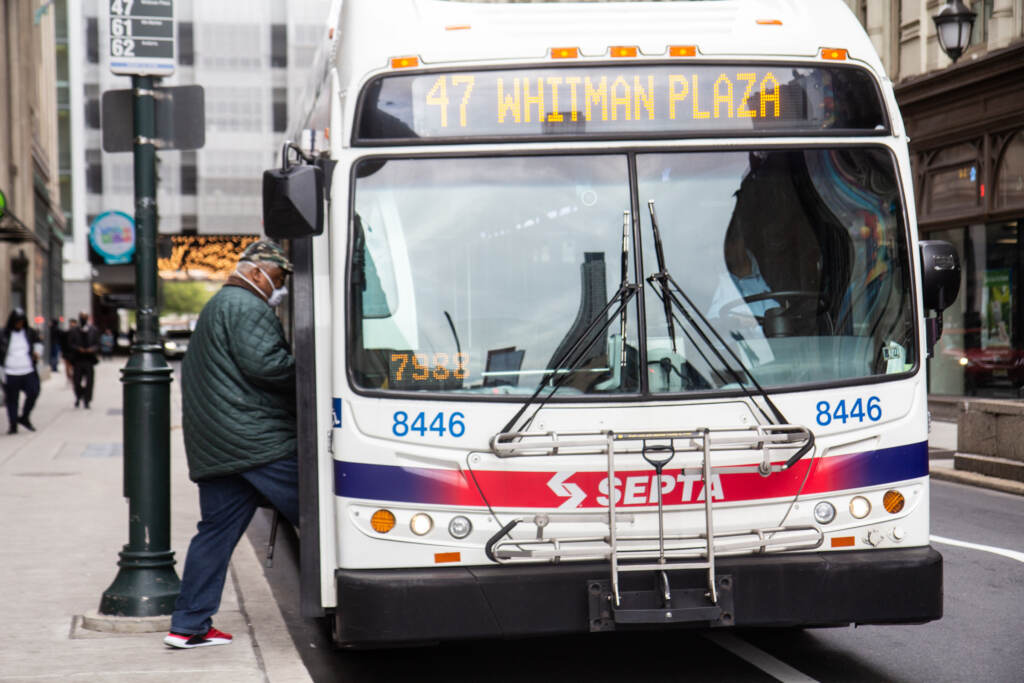
“I tell you the truth, I really don’t want to sit next to them,” she said as the bus approached.
When asked if that fear was enough to make her consider another form of transportation, she laughed.
“No I’m gonna keep on taking it,” she said, turning to board the 17. “I want to get home.”
WHYY is your source for fact-based, in-depth journalism and information. As a nonprofit organization, we rely on financial support from readers like you. Please give today.


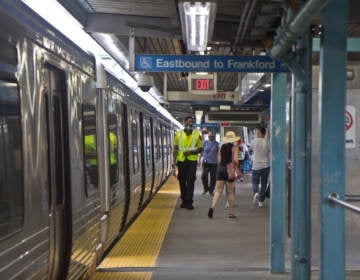
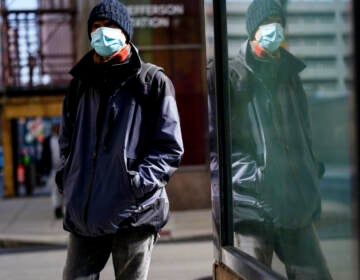

![CoronavirusPandemic_1024x512[1]](https://whyy.org/wp-content/uploads/2020/03/CoronavirusPandemic_1024x5121-300x150.jpg)
